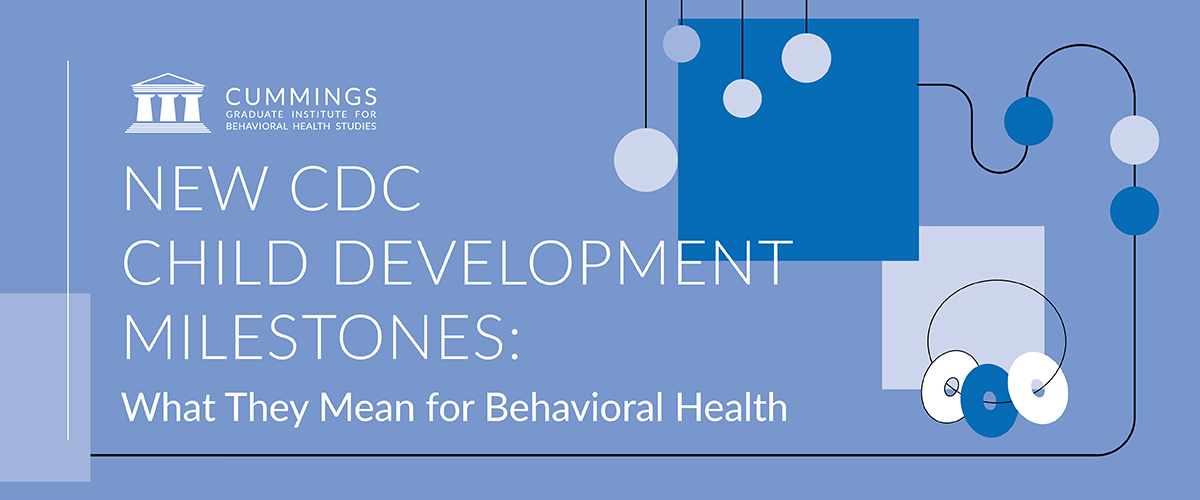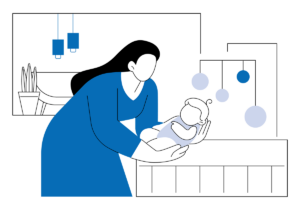
How the CDC’s Updated Child Development Milestones Impact Integrated Care and Behavioral Health
![]()
In 2022 and 2024, the Centers for Disease Control and Prevention (CDC) made significant updates to its child developmental milestones, aiming to improve the early identification of developmental delays. These changes reflect a shift toward more precise, actionable benchmarks, with potential ripple effects on integrated care and behavioral health practices.
What Changed in the Developmental Milestones?
The CDC’s updates were designed to reduce ambiguity and provide clearer guidance for parents and professionals. Key changes include:
- New Milestones: Added milestones for 15-month and 30-month-old toddlers, emphasizing social-emotional skills, such as smiling to gain attention at 4 months.
- Removed Milestones: Crawling was removed, acknowledging that some babies skip this stage entirely and progress directly to standing and walking.
- Adjusted Ages: The age for walking alone moved from 12 months to 15 months, and rolling from 4 months to 6 months.
- Lower Language Standards: The milestone for a 50-word vocabulary shifted from 2 years to 30 months.
- Higher Benchmark Standards: Milestone benchmarks now indicate that 75% (up from 50%) of children are expected to meet a milestone by a given age.
![]() These revisions aim to encourage earlier interventions for developmental delays and reduce confusion for parents and healthcare providers.
These revisions aim to encourage earlier interventions for developmental delays and reduce confusion for parents and healthcare providers.
Integrated Care: Implications for Early Intervention
The updates hold significant implications for integrated care, where behavioral health and primary care work together to address the holistic needs of children and their families. Early identification of developmental delays enables healthcare teams to create targeted interventions that address cognitive, emotional, and physical development.
“Early intervention is crucial for several reasons, particularly concerning child development, education, and health. The earlier any problems or difficulties are identified and addressed, the better a child’s chances of success. By intervening early, we can prevent minor issues from escalating into more complex and serious challenges. For instance, early intervention can help prevent behavioral problems or speech difficulties from worsening, which could hinder a child’s ability to learn and build relationships. Moreover, by providing families with the necessary tools and resources to support their children, early intervention benefits both the child and the family. This support can enhance overall well-being and reduce stress within the household.” said Emily Rodriguez Verdecia, M.S. CCC-SLP
Behavioral Health: Supporting Families Through Change
The updates may also affect behavioral health professionals, who often support families navigating developmental challenges.
“Many of these changes may ease the burden for parents when they realize that their children have more time to hit developmental milestones. As a parent myself, my youngest daughter did not walk until she was 15 months old because she had an older sister to retrieve all of her toys for her. Our pediatrician considered a physical therapy referral for her at 12 months, which heightened my anxiety. Had I known that walking at 15 months was more developmentally appropriate, I would have worried less about my baby achieving milestones.” says Dr. Rachel Grimes, DBH, LCSW-S, CGI DBH Program Alumna.
“Helping parents understand that every child is different, and some children will hit milestones later than others can bring peace of mind to parents, and even reduce the caseloads of behavioral health providers. Providers can target interventions to families that are actually experiencing developmental delays. We want to continue identifying children with developmental delays and conducting early interventions, but now we have more time to do so.” – Dr. Rachel Grimes, DBH, LCSW-S, CGI DBH Program Alumna
 Advancing Healthcare Education
Advancing Healthcare Education
Cummings Graduate Institute for Behavioral Health Studies (CGI) is uniquely positioned to address these changes through its Doctor of Behavioral Health (DBH) program. CGI students and alumni are trained to navigate shifts in healthcare guidelines, ensuring that they can provide integrated, evidence-based care to children and families.
Looking Ahead: A New Era for Developmental Milestones
As the CDC’s updated milestones continue to shape healthcare practices, professionals in integrated care and behavioral health must adapt to these changes. By providing clearer benchmarks and promoting earlier intervention, the CDC aims to improve outcomes for children and families alike.
Whether through collaboration with pediatricians, guidance for parents, or targeted interventions, integrated care and behavioral health professionals play a critical role in helping families navigate the complexities of child development.
Article Contributors
 Dr. Rachel Grimes, DBH, LCSW-S
Dr. Rachel Grimes, DBH, LCSW-S
Dr. Rachel Grimes is a licensed clinical social worker and supervisor, certified and an approved consultant in Eye Movement Desensitization and Reprocessing (EMDR) trauma therapy. She was drawn to the DBH program because she was already working as a clinical therapist in a medical setting. Dr. Grimes is part of the Cystic Fibrosis Care Center in Fort Worth, TX and provides integrated healthcare to pediatric and adult patients with CF and other pulmonary diseases. The skills and knowledge learned through the DBH program helped her improve and elevate care for her patients. Dr. Grimes also serves as the Clinical Director of a new mental health clinic in Fort Worth. Nora Mental Health is a national company that has been providing client centered care for almost a decade. Nora’s mission is to treat clients and staff members alike, with the utmost respect and care. The leadership and evidence-based skills that Dr. Grimes learned in the DBH program made her a perfect fit to lead the mission for the community of Fort Worth.
 Emily Rodriguez, M.S., CCC-SLP
Emily Rodriguez, M.S., CCC-SLP
Emily is a licensed pediatric speech-language pathologist (SLP) specializing in working with young children aged 2 to 5. She frequently collaborates with parents who have just received a diagnosis for their child, often serving as the first therapist on their child’s care team. Emily assesses communication skills in school and daycare settings, providing individualized recommendations and referrals to specialists such as occupational therapists, neurologists, or audiologists to ensure comprehensive support. As a licensed SLP in Florida, she addresses communication and social-pragmatic concerns, but with her Doctor of Behavioral Health (DBH) degree, she aims to become a licensed mental health counselor, equipping her to better guide parents through the diagnostic process and next steps. With years of experience serving families in the Miami area, Emily is now expanding her services to the Florida Keys, where access to therapy remains limited, particularly in the lower Keys. As a native of the area, she is passionate about providing a safe and supportive environment where children and families can access speech therapy, occupational therapy, and mental health counseling.






























